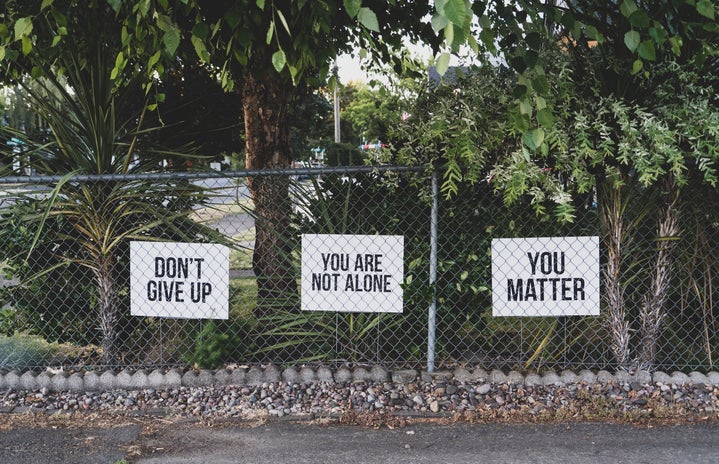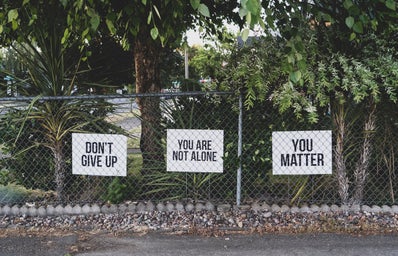Living with Depression is a constant battle. I was diagnosed at age 15, in the middle of my sophomore year of high school. Constant fatigue forced me to take frequent and long naps after class, leaving me feeling oddly empty and unmotivated to complete any of the assignments given to me by teachers. Though treatment and talking to counselors along with my parents were enough to help me gain partial control over my illness, depressive episodes still occur to this day. Unfortunately, this is how many of my peers feel as well. While some days medication and a healthy mindset is enough to get you through anything, others can be completely overcast by feelings of numbness and disinterest. So much so that, at times, it may feel impossible to even motivate yourself to get out of bed, let alone tackle the list of responsibilities that come with being a full-time or part-time college student. My alarm goes off and I’ll want nothing more than to press snooze and spend the day confined to my dorm, with a cup of ramen to keep me sustained and a pile of blankets to give me some comfort. But having paid tuition, there’s no choice but to get on a pair of shoes and take a crowded bus to class. Here are some ways I stay diligent in the fight against my mental illness, allowing for academic success despite any obstacle.
Communication
It may seem corny, but when trying to overcome any issue in life, communication is always key. Being open about struggles with mental illness can be disheartening, as neurotypical friends and family may have trouble fully understanding the symptoms of depression. Yet informing those in your life that at times you may be distant will help jumpstart an attitude of openness that in turn will help you accept your circumstances and avoid any interpersonal conflicts. Openness in your personal life does not only help you day to day, but will make it easier to discuss depression with professors and other professional influences in your life. Don’t be afraid to schedule a meeting with your professors or even send a quick email to inform them of your situation, so together you will be prepared should your symptoms affect your performance in class.
Most educators are incredibly familiar with mental health struggles, as according to the American Psychological Association, 36.4 percent of college students are diagnosed with Depression. Professors want you to succeed in their courses as much as you do and should be seen as allies rather than something to add to your list of stresses. There are a variety of resources on campus including Disability Services, which can help you receive legal documentation and accommodations regarding your illness to help you stay on top of work, and CAPS (Counseling, Alcohol and Other Drug Assistance Program & Psychiatric Services) which provides free counseling for any registered Rutgers student. Staying diligent and being honest about your issues is a very difficult task, especially when you feel there is no way to help your suffering, but this big step is crucial to beginning the long battle of receiving your degree.
Set Simple Goals
There is no shame in admitting that sometimes, you may fail at the large academic goals you set. When taking a shower feels as challenging as running a marathon, the last thing you want to worry about is finishing assignments. No one can find progress without some drawbacks, so this is entirely to be expected. By creating a small but lengthy list of simple daily tasks (i.e. eating a substantial meal, making your bed, changing your clothes…) and placing a check to each completed item, you will see just how much you have accomplished despite a depressive episode. This often motivates me to keep going and tackle the big tasks set for the day. Even if you only manage to make it to class and get about halfway started with assignments, you’ll see that breaking out of the fog is possible, and will slowly start to feel more motivated and accomplished.
Find Some “Life Hacks”
It can be hard to understand for those without depression, but when your brain is suffering from a complete lack of dopamine and serotonin, simple tasks suddenly become overwhelming. As I mentioned before, even getting food with friends, keeping up with hygiene, and holding small conversations can seem like monumental challenges. Try investing in easy meals to prepare like instant ramen, soup, or frozen dinners so there is little to no preparation involved in eating. Things like dry shampoo, mouthwash strips, hand sanitizer, etc. can help you feel refreshed and clean throughout your day, especially if you fall behind your usual schedule. Sending a simple snapchat or silly picture to just one person on your contact list each day, even if you don’t feel like holding a conversation can help you stay engaged and make feelings of loneliness slightly subside. Little things like this can help you get back on your feet when really struggling, and ensure that despite anything, you still have parts of your usual daily routine when getting ready for a day of classes.
Don’t Give Up
The most important thing you can do while battling depression is to never let yourself believe there is no hope for recovery. At the end of the day, this is your life and future, and only you have the power to control it. Reminding yourself that this is just a chemical imbalance and has nothing to do with your self-worth or potential is essential. There comes a point where you must accept your challenges and push on despite them, no matter how difficult that might be. In order to receive help, you must first help yourself, which I know everyone is capable of doing.
You’ve made it this far, you’ve been accepted to a university and are building the foundations for a bright future which alone is unbelievably impressive. Even if you find yourself falling, or may even feel the need to take a leave of absence from school, you will always have the power to pick yourself back up. College is massively hard for all students and your situation can easily make it harder, but never let that stop you from growing.



